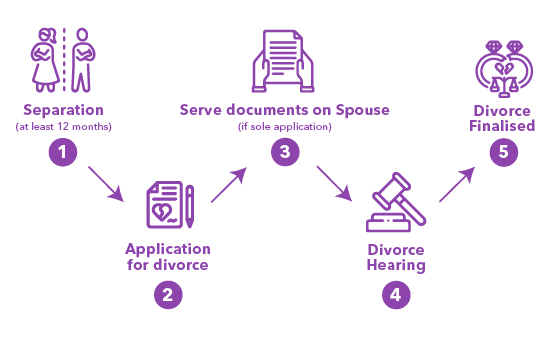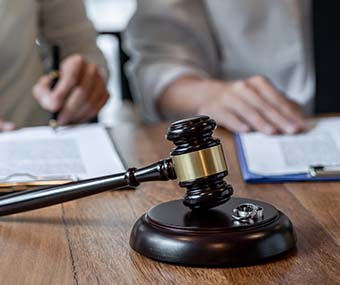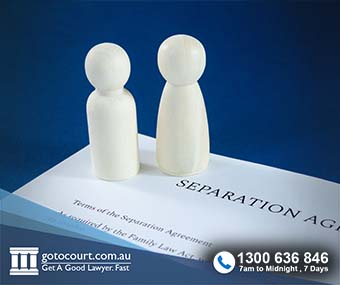Serving Divorce Papers
Serving Divorce Papers
Divorce is the legal process of ending a marriage. Under the Family Law Act 1975, an applicant must satisfy certain requirements to obtain a divorce, including the requirement for service. This page looks at the legal requirements when serving divorce papers in Australia.

IMPORTANT: The process of divorce is separate from arrangements for the care of children and the division of marital property. Learn more about the care of children here and property division here.
Applying for divorce
The Federal Circuit and Family Court of Australia is the only court with the power to grant a divorce in Australia. In order to obtain a divorce, it is necessary to lodge an online application and provide specific documents (such as a copy of the marriage certificate). When the applicant lodges the application, a court date will be assigned for the divorce hearing.
When a former couple agrees to divorce, they can file a joint application for divorce. However, if one spouse does not cooperate, the other person can still file a ‘sole application’. When an applicant makes a sole application, they must then ‘serve’ the divorce papers on their spouse.
Serving divorce papers
A sole applicant has a legal obligation to notify the other spouse (called the ‘respondent’) when they make a divorce application. They can do this by serving sealed copies of the Application for Divorce and an Affidavit of eFiling (a statement swearing that the document was filed). Service provides proof to the court that the respondent is aware of the divorce application and has copies of the relevant documents.
What is a sealed document?
When a document is lodged with a court, it is stamped with the time and date of lodgement. Documents lodged online are stamped electronically. A document with a court stamp is described as ‘sealed’.
When serving the divorce papers, the applicant also needs to provide a copy of a court brochure called “Marriages, Families and Separation” (which can be downloaded from the court website) and an Acknowledgement of Service (a form that the respondent signs to say they have received the divorce papers).
Types of service
Divorce papers can be served on the respondent either by hand or post. The simplest way to serve divorce papers is to send them in a pre-paid sealed envelope addressed to the respondent at their last known address. When serving divorce papers through the post, the applicant must include a self-addressed envelope so the respondent can send back the Acknowledgement of Service.
DEADLINES FOR SERVICE: If the respondent is in Australia, the divorce papers must be served at least 28 days prior to the court hearing date. If the spouse is overseas, the papers must be served at least 42 days prior to the court hearing.
Alternatively, divorce papers can be served through ‘personal service’, which means that the papers are delivered by a person directly into the hands of the respondent. The applicant is not allowed to serve the respondent themselves but can be present during the personal service. Sometimes a respondent is unwilling to take divorce papers when they are served. In that case, the server can place the envelope down in their presence while informing the respondent of the contents.
Respondents in prison
When an applicant’s spouse is in prison, the applicant needs to find out the location of the prison and the prisoner’s Master Index Number (MIN). The applicant must mail the divorce documents to the person in charge of the prison, identifying the respondent and requesting that the documents be provided to them. The person in charge of the prison will sign the Acknowledgement of Service with a notation of their position.
Respondents who are disabled
When the respondent has a disability that might stop them from understanding the divorce papers, then the papers are served on someone who is responsible for the respondent. This is their legal guardian (if they have one) or an adult who cares for the respondent.
Respondents who are overseas
When the respondent is overseas, the method of service depends on their location. For countries that are parties to the Hague Convention, service is typically possible through an arrangement with the Attorney-General’s Department. When the country is not a party to the Hague Convention, it is best to obtain legal advice on how to file an application for substituted service or seek permission to dispense with service altogether.
What is the spouse cannot be located?
In the event that an applicant cannot locate their spouse after reasonable efforts, they can apply to dispense with the requirement for service. The Court may alternatively allow “substituted service” on an appropriate third party who can pass the documents on to the spouse (for instance, the divorce papers could be served on the respondent’s parents). Before the Court makes such an order, the applicant must file an affidavit explaining in detail all the efforts they have made to serve the documents.
Evidence of service
The respondent (or the respondent’s lawyer) acknowledges receipt of the divorce papers by signing the Acknowledgement of Service form. However, the respondent is not always willing to sign the form. In that case, the person who served the papers can sign an affidavit swearing that they served them on the respondent. The server can identify the respondent from a photograph. Alternatively, another person who witnessed the service and can identify the respondent can provide evidence of service.
Please get in touch with Go To Court Lawyers for assistance with serving divorce papers. Our family law solicitors can help you obtain a divorce decree, negotiate a property settlement, or help make parenting arrangements.

Affordable Lawyers
Our Go To Court Lawyers will assist you in all areas of law. We specialise in providing legal advice urgently – at the time when you need it most. If you need a lawyer right now, today, we can help you – no matter where you are in Australia.How It Works




1. You speak directly to a lawyer
When you call the Go To Court Legal Hotline, you will be connected directly to a lawyer, every time.

2. Get your legal situation assessed
We determine the best way forward in your legal matter, free of charge. If you want to go ahead and book a face-to-face appointment, we will connect you with a specialist in your local area.

3. We arrange everything as needed
If you want to go ahead and book a fact-to-face appointment, we will connect you with a specialist in your local area no matter where you are and even at very short notice.



















